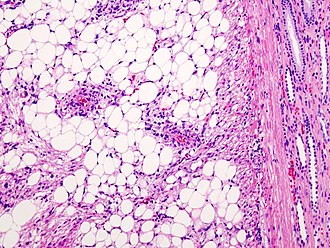Angiomyolipoma
Revision as of 06:10, 25 July 2014 by Michael (talk | contribs) (→Epithelioid AML versus Xp11.2 translocation carcinoma)
| Angiomyolipoma | |
|---|---|
| Diagnosis in short | |
 Angiomyolipoma. H&E stain. | |
|
| |
| LM | smooth muscle, adipose tissue (not always present), abundant blood vessels |
| Subtypes | conventional, epithelioid angiomyolipoma |
| LM DDx | clear cell renal cell carcinoma (esp. for epithelioid variant), Xp11.2 translocation carcinoma (esp. for epithelioid variant) |
| IHC | HMB-45 +ve, Melan A +ve, SMA +ve |
| Site | kidney (see kidney tumours), other sites |
|
| |
| Syndromes | tuberous sclerosis |
|
| |
| Prevalence | uncommon |
| Radiology | classically has regions consistent with fat |
| Prognosis | benign, epithelioid variant may be aggressive |
| Clin. DDx | other kidney tumours |
| Treatment | surgery - esp. if large or imaging characteristics ambiguous |
Angiomyolipoma, abbreviated AML, is a benign mesenchymal tumour that is associated with tuberous sclerosis and belongs to the PEComa group of tumours.
It is typically found in the kidney.
General
- Benign mesenchymal tumour.
- Presentations: flank pain, hematuria, incidentaloma.[1]
- Tumours >4 cm considered a risk for bleeding.[2]
- AMLs occur may be elsewhere in the body, e.g. liver,[3] but are most common in the kidney.
- In the PEComa group of tumours.
Epidemiology
- May be associated with tuberous sclerosis -- 70% have an AML.
- When compared to sporadic cases:
- More often bilateral.
- Usually bigger.
- When compared to sporadic cases:
- There is a suggestion that an epithelioid variant is more worrisome.[4]
- This is not confirmed by all studies.[5]
Microscopic
Features:
- Smooth muscle.
- Adipose tissue - not always present[6] - key feature.
- Abundant blood vessels.
Images
Epithelioid angiomyolipoma
Features:
- Carcinoma-like morphology.
- +/-Spindle cells.
- "High grade" nuclei.
- Pleomorphic nuclei.
DDx:
- Clear cell renal cell carcinoma eosinophilic variant - esp. if epithelioid.
- Xp11.2 translocation carcinoma.
Images:
- Epithelioid AML (birjournals.org).
- Epithelioid AML (rsna.org).
- Atypical epithelioid AML (archivesofpathology.org).[7]
Cytologic
Features[6]
- Nuclei - round/ovoid.
- Chromatin - bland.
IHC
- Melanocytic markers +ve.[8]
- HMB-45 +ve in all cases (15/15).[9]
- Melan A +ve in ~87% of cases (13/15).
- Epithelial markers -ve[8], e.g. EMA and AE1/AE3.
- SMA +ve.
- CD117 +ve/-ve.
- Ki-67:[10]
- Epithelioid variant of AML +ve.
- Conventional AML -ve.
Epithelioid AML versus Xp11.2 translocation carcinoma
- PAX8 -ve.
- Positive in Xp11.2 translocation carcinoma.
- CAIX -ve.
- AE1/AE3 -ve.
- EMA -ve.
See also
References
- ↑ Seyam, RM.; Bissada, NK.; Kattan, SA.; Mokhtar, AA.; Aslam, M.; Fahmy, WE.; Mourad, WA.; Binmahfouz, AA. et al. (Nov 2008). "Changing trends in presentation, diagnosis and management of renal angiomyolipoma: comparison of sporadic and tuberous sclerosis complex-associated forms.". Urology 72 (5): 1077-82. doi:10.1016/j.urology.2008.07.049. PMID 18805573.
- ↑ Abrams, J.; Yee, DC.; Clark, TW. (Jul 2011). "Transradial embolization of a bleeding renal angiomyolipoma.". Vasc Endovascular Surg 45 (5): 470-3. doi:10.1177/1538574411408352. PMID 21571778.
- ↑ Zhang, SH.; Cong, WM.; Xian, ZH.; Wu, WQ.; Dong, H.; Wu, MC. (Oct 2004). "[Morphologic variants and immunohistochemical features of hepatic angiomyolipoma.]". Zhonghua Bing Li Xue Za Zhi 33 (5): 437-40. PMID 15498214.
- ↑ Nelson, CP.; Sanda, MG. (Oct 2002). "Contemporary diagnosis and management of renal angiomyolipoma.". J Urol 168 (4 Pt 1): 1315-25. doi:10.1097/01.ju.0000028200.86216.b2. PMID 12352384.
- ↑ Aydin, H.; Magi-Galluzzi, C.; Lane, BR.; Sercia, L.; Lopez, JI.; Rini, BI.; Zhou, M. (Feb 2009). "Renal angiomyolipoma: clinicopathologic study of 194 cases with emphasis on the epithelioid histology and tuberous sclerosis association.". Am J Surg Pathol 33 (2): 289-97. doi:10.1097/PAS.0b013e31817ed7a6. PMID 18852677.
- ↑ 6.0 6.1 Crapanzano, JP. (Jan 2005). "Fine-needle aspiration of renal angiomyolipoma: cytological findings and diagnostic pitfalls in a series of five cases.". Diagn Cytopathol 32 (1): 53-7. doi:10.1002/dc.20179. PMID 15584043.
- ↑ Aljerian, K.; Evans, AJ. (Oct 2004). "Pathologic quiz case: a 44-year-old woman with an incidental asymptomatic renal mass. Atypical epithelioid angiomyolipoma.". Arch Pathol Lab Med 128 (10): 1176-8. doi:10.1043/1543-2165(2004)1281176:PQCAYW2.0.CO;2. PMID 15387699.
- ↑ 8.0 8.1 Zhou, Ming; Magi-Galluzzi, Cristina (2006). Genitourinary Pathology: A Volume in Foundations in Diagnostic Pathology Series (1st ed.). Churchill Livingstone. pp. 324. ISBN 978-0443066771.
- ↑ Esheba, Gel S.; Esheba, Nel S. (Sep 2013). "Angiomyolipoma of the kidney: clinicopathological and immunohistochemical study.". J Egypt Natl Canc Inst 25 (3): 125-34. doi:10.1016/j.jnci.2013.05.002. PMID 23932749.
- ↑ Ooi, SM.; Vivian, JB.; Cohen, RJ. (2009). "The use of the Ki-67 marker in the pathological diagnosis of the epithelioid variant of renal angiomyolipoma.". Int Urol Nephrol 41 (3): 559-65. doi:10.1007/s11255-008-9473-1. PMID 18839327.
- ↑ Amin MB, Epstein JI, Ulbright TM, et al. (August 2014). "Best practices recommendations in the application of immunohistochemistry in urologic pathology: report from the international society of urological pathology consensus conference". Am. J. Surg. Pathol. 38 (8): 1017–22. doi:10.1097/PAS.0000000000000254. PMID 25025364.


